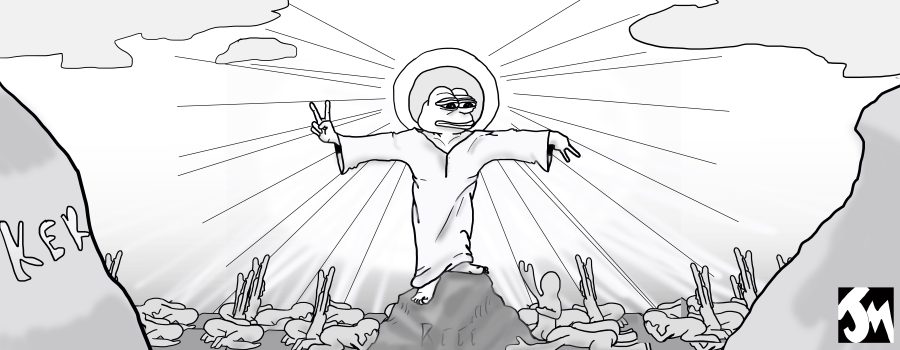Earlier this semester, The Campanile published a spotlight on breaking Palo Alto’s ideological “bubble.” But there is also an equally troubling problem which has received less attention: how do we break the bubble surrounding ourselves? The answer cannot be simply phrased. A variety of factors — namely stress, pressure and competition — conspire against Palo Alto High School students on the daily. With heavy course loads and extracurricular activities, a toxic shadow looms over many of the brightest minds of our school, trapping them in a mental prison. My prognosis? Death by Meme.
Many students at Palo Alto High School are well-versed in “Meme culture.” Memes, for those far enough removed from society to not know, are humorous pictures captioned by short sentences. In the past few years, thousands of social media accounts have gained popularity by posting Meme content geared exclusively towards teenagers. The prevalence of such accounts is significant enough to classify Memery as a cultural phenomenon.
The posts with the most student traffic generally deal with names of sadness and unmanageable commitments, which are fine to joke about in small doses. However, nothing around here is ever done in moderation. If you are friends with a Paly student on Facebook, you are likely bound to see people tagging one another in the comments of these self-deprecating pictures on any night of the week. After a certain time — admittedly a short one — this perpetuation of self-deprecation turns to self-loathing; that self-loathing can, in turn, spiral out into mental illnesses.
The fact of the matter is that Meme culture is now synonymous with stress culture.
Story continues below advertisement
At universities especially, where Facebook pages like “UC Berkeley Memes for Edgy Teens” and “Columbia Buy Sell Memes” pick up thousands of student members, a cry for help lies just below the surface of sarcastic jokes about crippling depression. It seems like the higher up the educational food chain one goes, the worse the situation gets. Many top-ranked colleges, such as the previously-mentioned Berkeley and Columbia, as well as Washington University in St. Louis and the University of Chicago are all struggling with student mental health support while simultaneously boasting some of the world’s most visited Meme pages.
Students who attend these schools are on course to becoming some of the world’s most powerful people someday and their personalities, sculpted in part by Memes, will be instrumental in shaping the future.
This is not to say that all Memes should be condemned. A pick-me-up laugh once in awhile is a universal necessity, and spending hours on purely comedic Memes, ones that do not emphasize stress and ineptitude, is harmful only in that it wastes time.
So where does this all leave Paly students? It is crucial in our high-pressure community to stay positive and pick ourselves up rather than put ourselves down. Far and away, the most frightening part about Meme culture is that it is taken entirely with a grain of salt. You laugh at things that make you laugh, disqualifying them from being problems; Memes are jokes and jokes supposedly do not cause major mental health epidemics.
If you choose to be active in Meme pages, do so sparingly, or at least consciously.
Hours spent degrading who you are as a human being is guaranteed not to help you achieve great things. Be mindful of what you put into your body, especially when what you are absorbing into your body are distorted Spongebob screencaps. In this way, we can all begin to burst the aforementioned bubble around ourselves.
We consume Memes all the time; at what point do Memes begin to consume us?

